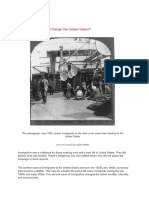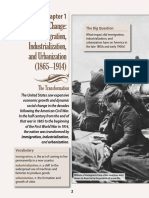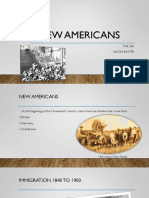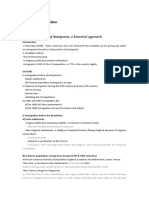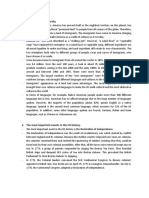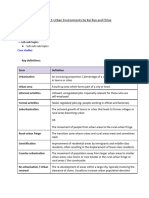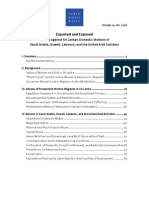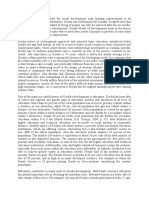0 ratings0% found this document useful (0 votes)
49 viewsNew Immigrants Notes
New Immigrants Notes
Uploaded by
api-284427789New immigrants came to the United States in large numbers after the Civil War, primarily from Southern and Eastern Europe. They faced difficulties integrating due to unfamiliar languages and beliefs. Many left their homelands due to economic hardship and persecution. Immigrants viewed America as a land of opportunity. The journey was difficult, involving travel to ports and long voyages in cramped conditions. Upon arrival, immigrants passed through reception centers at Ellis Island or Angel Island, where they were screened for illnesses before entering the country. The greatest challenge for new immigrants was finding work. Many took difficult, unskilled jobs with long hours. Most settled in cities and worked in factories or sweatshops. Immigrants strove to maintain aspects of their cultural identities within American
Copyright:
© All Rights Reserved
Available Formats
Download as DOCX, PDF, TXT or read online from Scribd
New Immigrants Notes
New Immigrants Notes
Uploaded by
api-2844277890 ratings0% found this document useful (0 votes)
49 views2 pagesNew immigrants came to the United States in large numbers after the Civil War, primarily from Southern and Eastern Europe. They faced difficulties integrating due to unfamiliar languages and beliefs. Many left their homelands due to economic hardship and persecution. Immigrants viewed America as a land of opportunity. The journey was difficult, involving travel to ports and long voyages in cramped conditions. Upon arrival, immigrants passed through reception centers at Ellis Island or Angel Island, where they were screened for illnesses before entering the country. The greatest challenge for new immigrants was finding work. Many took difficult, unskilled jobs with long hours. Most settled in cities and worked in factories or sweatshops. Immigrants strove to maintain aspects of their cultural identities within American
Original Title
new immigrants notes
Copyright
© © All Rights Reserved
Available Formats
DOCX, PDF, TXT or read online from Scribd
Share this document
Did you find this document useful?
Is this content inappropriate?
New immigrants came to the United States in large numbers after the Civil War, primarily from Southern and Eastern Europe. They faced difficulties integrating due to unfamiliar languages and beliefs. Many left their homelands due to economic hardship and persecution. Immigrants viewed America as a land of opportunity. The journey was difficult, involving travel to ports and long voyages in cramped conditions. Upon arrival, immigrants passed through reception centers at Ellis Island or Angel Island, where they were screened for illnesses before entering the country. The greatest challenge for new immigrants was finding work. Many took difficult, unskilled jobs with long hours. Most settled in cities and worked in factories or sweatshops. Immigrants strove to maintain aspects of their cultural identities within American
Copyright:
© All Rights Reserved
Available Formats
Download as DOCX, PDF, TXT or read online from Scribd
Download as docx, pdf, or txt
0 ratings0% found this document useful (0 votes)
49 views2 pagesNew Immigrants Notes
New Immigrants Notes
Uploaded by
api-284427789New immigrants came to the United States in large numbers after the Civil War, primarily from Southern and Eastern Europe. They faced difficulties integrating due to unfamiliar languages and beliefs. Many left their homelands due to economic hardship and persecution. Immigrants viewed America as a land of opportunity. The journey was difficult, involving travel to ports and long voyages in cramped conditions. Upon arrival, immigrants passed through reception centers at Ellis Island or Angel Island, where they were screened for illnesses before entering the country. The greatest challenge for new immigrants was finding work. Many took difficult, unskilled jobs with long hours. Most settled in cities and worked in factories or sweatshops. Immigrants strove to maintain aspects of their cultural identities within American
Copyright:
© All Rights Reserved
Available Formats
Download as DOCX, PDF, TXT or read online from Scribd
Download as docx, pdf, or txt
You are on page 1of 2
New Immigrants- Ellis Island
1. The New Immigrants
Before 1865 most immigrants other than enslaved Africans came from northern and
western Europe.
In the mid-1800s, large groups of new immigrants came from _______________Europe.
They came from Ireland, Germany, Italy, Greece, Poland, Hungary and Russia.
___________ of all immigrant population.
Many people came to the United States from ___________________after the Civil War.
After 1900, immigration from Mexico increased.
Immigrants had unfamiliar languages and religious beliefs and had difficulty blending into
American society.
2.
Push Factors: Leaving troubles Behind
Many people ________________, or left their homelands, because of economic hardship.
Italy and Hungary- overcrowding and poverty
Many others fled their homelands because some countries made ___________________
against certain ethnic groups, people who share a common culture or heritage.
Russia and Poland (Eastern Europe) - More than 2.5 million Jews fled such treatment
between 1880 and 1924.
3. Pull Factors: Opportunity
Immigrants viewed the United States as a place of ____________________________.
Some immigrants returned home after a few years, but most stayed.
4. Journey to the United States
The Journey to the United States was often difficult.
Immigrants first traveled to a _________________, at times ports were hundreds of
miles from home.
Then came the long ocean voyage- 12 days from Europe, several weeks from Asia.
Many immigrants could only afford the cheapest ticket.
They traveled in cramped quarters on the lower decks of ships- this section was known as
________________.
5. Entering the United States
Most immigrants from Europe landed at New York City.
After 1886, those who arrived were greeted by the
______________________________________ as they sailed into New York Harbor.
The Statue of Liberty was a gift from the nation of ____________________ and
promised hope for a better life.
Before entrance into the United States, immigrants had to pass through government
reception centers.
In the East, immigrants came through _________________________ in New York
Harbor.
Most Asian immigrants sailed to California. They went through the processing center on
______________________________ in San Francisco Bay.
____________________ recorded the immigrants names, asked them where they came
from, their occupation and whether they had relatives in the United States.
New immigrants were also given ___________________________________. Those
with contagious illnesses could be stopped from entering the United States.
6. The Immigrant Experience
The greatest challenge was _____________________. Sometimes organizations from
their homelands ____________________, or tried to sign up, workers for jobs in the
United States.
They were unskilled and were used to unload cargo, dig ditches or similar work.
Most immigrant men in the early 1900s were ____________________, working 12 hour
days, 7 days a week.
Immigrant women and children worked in sweatshops making clothing.
Most new immigrants came from rural areas. Yet, were too poor to buy farmland in the
United States.
Most settled in ____________________.
With little or no education, they worked in ______________________.
Ethnic groups often formed their own communities. Neighborhoods of Jewish, Italian,
Chinese, etc. developed in many cities.
Many immigrants wanted to ______________________________________.
You might also like
- American - Immigration Scavenger HuntDocument4 pagesAmerican - Immigration Scavenger HuntdanielNo ratings yet
- Grade 8 Source 1jDocument3 pagesGrade 8 Source 1japi-233875667No ratings yet
- Czech and Slovak Immigration to America: When, Where, Why and HowFrom EverandCzech and Slovak Immigration to America: When, Where, Why and HowNo ratings yet
- New ImmigrantssDocument13 pagesNew Immigrantssapi-284427789No ratings yet
- DD - His 02.04Document11 pagesDD - His 02.04jujust24370No ratings yet
- Immigration & Industrialization: Mr. Severson U.S History November 9th, 2015Document11 pagesImmigration & Industrialization: Mr. Severson U.S History November 9th, 2015api-309262315No ratings yet
- Textbook - Topic 1 Lesson 4Document7 pagesTextbook - Topic 1 Lesson 4ryanNo ratings yet
- History, U.S. Honors - CH 8-2 LectureDocument3 pagesHistory, U.S. Honors - CH 8-2 LectureMarty IrwinNo ratings yet
- The Golden DoorDocument4 pagesThe Golden DoorloganzxNo ratings yet
- Reading A New Wave of ImmigrationDocument3 pagesReading A New Wave of Immigrationnittany182302No ratings yet
- U.S. HistoryDocument2 pagesU.S. HistorycdaabigaiNo ratings yet
- Immigration To America Assessment MedtDocument1 pageImmigration To America Assessment Medtapi-404671760No ratings yet
- Egp 335 Power PointDocument7 pagesEgp 335 Power Pointapi-301878706No ratings yet
- Immigration Industrialization and UrbanizationDocument94 pagesImmigration Industrialization and Urbanizationdodo demyanaNo ratings yet
- A HISTORY OF THE UNITED STATES Modern Times Late 1800s To The 2000s - Chapter 1Document22 pagesA HISTORY OF THE UNITED STATES Modern Times Late 1800s To The 2000s - Chapter 1snunezNo ratings yet
- Edad Moderna 5º PrimariaDocument2 pagesEdad Moderna 5º PrimariaAida GarcíaNo ratings yet
- Resumen Mundos 2Document13 pagesResumen Mundos 2witericoNo ratings yet
- Ellis IslandDocument5 pagesEllis IslandawalimapoNo ratings yet
- Polish Immigrants (2004)Document97 pagesPolish Immigrants (2004)3t1990No ratings yet
- Age of Exploration Discovery and Expansion Guided NotesDocument4 pagesAge of Exploration Discovery and Expansion Guided Notesapi-249843697No ratings yet
- USA: Melting Pot or A Salad Bowl?Document2 pagesUSA: Melting Pot or A Salad Bowl?Für AnikóNo ratings yet
- New Immigrants Lesson 15-1Document9 pagesNew Immigrants Lesson 15-1KristinNo ratings yet
- Make A Summary - 08 April 2022Document2 pagesMake A Summary - 08 April 2022vickyoctarina.21No ratings yet
- Third Year Immigration From Late 19 Century To Early 20 CenturyDocument3 pagesThird Year Immigration From Late 19 Century To Early 20 CenturyRobin ScherbatskyNo ratings yet
- Polish ImmigrantsDocument97 pagesPolish ImmigrantsMarcelo Zamora100% (2)
- 7 New Americans: The Usa Alison BaxterDocument8 pages7 New Americans: The Usa Alison BaxterHugoAlmNo ratings yet
- Scavenger Hunt StudentDocument4 pagesScavenger Hunt Studentapi-317851832No ratings yet
- Reasons Why You Shouldn't Ignore Immigration HistoryDocument5 pagesReasons Why You Shouldn't Ignore Immigration HistorydonatasfeqNo ratings yet
- Ellis Island: Tracing Your Family History Through America's GatewayFrom EverandEllis Island: Tracing Your Family History Through America's GatewayRating: 3.5 out of 5 stars3.5/5 (2)
- Summer School Asian Immigration SLIDES Graphic OrganizerDocument4 pagesSummer School Asian Immigration SLIDES Graphic OrganizermfajnermanNo ratings yet
- Civilisation: Immigration and The USA (2nd Wave)Document28 pagesCivilisation: Immigration and The USA (2nd Wave)Simon BecquetNo ratings yet
- Immigration in The United States of AMericaDocument1 pageImmigration in The United States of AMericaBoueNo ratings yet
- Gale Researcher Guide for: Overview of Immigration and Urbanization in the Gilded Age and Progressive EraFrom EverandGale Researcher Guide for: Overview of Immigration and Urbanization in the Gilded Age and Progressive EraNo ratings yet
- American Civilization 2Document3 pagesAmerican Civilization 2zheyiduNo ratings yet
- Summary Worksheet 3 PDFDocument2 pagesSummary Worksheet 3 PDFadnanulhaqNo ratings yet
- American West and Industrialization Part 1Document11 pagesAmerican West and Industrialization Part 1Christian JonesNo ratings yet
- CM 1 - ImmigrationDocument9 pagesCM 1 - ImmigrationSimon BecquetNo ratings yet
- Lesson 26 The Great Wave of ImmigrationDocument29 pagesLesson 26 The Great Wave of Immigrationfishertr1No ratings yet
- The Huddled Masses: Immigration: The Statue of LibertyDocument8 pagesThe Huddled Masses: Immigration: The Statue of LibertyDylanNo ratings yet
- chapter-15-immigration-readingsDocument16 pageschapter-15-immigration-readingse11771No ratings yet
- Industrial Revolution of The U.S. After 1783Document7 pagesIndustrial Revolution of The U.S. After 1783AlleighaNo ratings yet
- 4 Gilded Age Immigration and UrbanizationDocument21 pages4 Gilded Age Immigration and Urbanizationapi-334758672No ratings yet
- Backround Knowledge: A Fresh StartDocument2 pagesBackround Knowledge: A Fresh Startamalea59No ratings yet
- A History of the Italian Immigrants from the Seven Towns of the Asiago Plateau In the Region of the Veneto In Italy On the Gogebic Iron Range of Michigan and Wisconsin from the 1890s to the 1950sFrom EverandA History of the Italian Immigrants from the Seven Towns of the Asiago Plateau In the Region of the Veneto In Italy On the Gogebic Iron Range of Michigan and Wisconsin from the 1890s to the 1950sNo ratings yet
- Oana Chirita - American ImmigrationDocument10 pagesOana Chirita - American ImmigrationAndreea ŞoldanNo ratings yet
- Presentation 1Document10 pagesPresentation 1api-384083823No ratings yet
- Apush Midterm EssayDocument2 pagesApush Midterm Essayapi-311220399No ratings yet
- Summary Worksheet 3Document2 pagesSummary Worksheet 3Niña GuardianoNo ratings yet
- Immigra'on and Migra'on: Image FromDocument3 pagesImmigra'on and Migra'on: Image Fromapi-264035822No ratings yet
- The US Cultural DiversityDocument4 pagesThe US Cultural DiversityPhạm Ngọc MaiNo ratings yet
- Name: - APUSH Midterm Study GuideDocument28 pagesName: - APUSH Midterm Study GuideJackson BeebeeNo ratings yet
- Features of Immigration 2Document2 pagesFeatures of Immigration 2Soledad NallarNo ratings yet
- the US immigration historyDocument2 pagesthe US immigration historylilanola3No ratings yet
- The Great Emigration From The Tyrol - Part 3Document2 pagesThe Great Emigration From The Tyrol - Part 3crbrunelliNo ratings yet
- US Immigration History Post 1870 - Demography & Settlement for Kids | Timelines of History for Kids | 6th Grade Social StudiesFrom EverandUS Immigration History Post 1870 - Demography & Settlement for Kids | Timelines of History for Kids | 6th Grade Social StudiesNo ratings yet
- Migration in The CaribbeanDocument8 pagesMigration in The Caribbeanapi-291989981No ratings yet
- TCW Topic IIDocument14 pagesTCW Topic IIJohn Neil BalaongNo ratings yet
- Animal MigrationDocument15 pagesAnimal Migrationshahzadrana543No ratings yet
- Italy Schengen Application Form 2020Document4 pagesItaly Schengen Application Form 2020Gulf Steel SalamNo ratings yet
- Application For Residence Permit For Persons Who ... - MigrationsverketDocument2 pagesApplication For Residence Permit For Persons Who ... - MigrationsverketSober KhanNo ratings yet
- N/A N/A N/A N/A: Afghanistan Albania Algeria Andorra Angola Antigua and Barbuda ArgentinaDocument9 pagesN/A N/A N/A N/A: Afghanistan Albania Algeria Andorra Angola Antigua and Barbuda ArgentinaRudresh SolankiNo ratings yet
- IGCSE Geography SyllabusDocument9 pagesIGCSE Geography SyllabusDhruv BhallaNo ratings yet
- Step-by-Step Guide To Applying For COS FINALDocument1 pageStep-by-Step Guide To Applying For COS FINALSaurabhNo ratings yet
- Form 'C': Arrival Report of Foreigner in Guest HouseDocument7 pagesForm 'C': Arrival Report of Foreigner in Guest HouseGursimranjeet SinghNo ratings yet
- VALENTA Et Al 2019 Deterrence Southern EuropeDocument10 pagesVALENTA Et Al 2019 Deterrence Southern EuropeANo ratings yet
- Recognizing The Phenomenon of Seasonal MigrationDocument3 pagesRecognizing The Phenomenon of Seasonal MigrationDheeraj DubeyNo ratings yet
- Visa Application Form (To Be Completed in BOLD CAPS With Black or Blue Ink)Document2 pagesVisa Application Form (To Be Completed in BOLD CAPS With Black or Blue Ink)Samuel JosephNo ratings yet
- USA DV Lottery Apply NowDocument5 pagesUSA DV Lottery Apply Nowmomitsingh4No ratings yet
- Geography Research (Desree)Document21 pagesGeography Research (Desree)princeNo ratings yet
- The Bugis Diaspora in Malaysia A Quest For Cultural Identity On Collective Memories Through Social MediaDocument17 pagesThe Bugis Diaspora in Malaysia A Quest For Cultural Identity On Collective Memories Through Social MediaLan Anh TrầnNo ratings yet
- Push and Pull Factors For Migration of Foreign Pharmacists To NorwayDocument91 pagesPush and Pull Factors For Migration of Foreign Pharmacists To NorwayDarwin S. ColindresNo ratings yet
- GLTR Chapter Five Major Contemporary Global IssuesDocument24 pagesGLTR Chapter Five Major Contemporary Global IssuesErmi Zuru100% (2)
- Paper 1 - Urbanisation (Option G)Document45 pagesPaper 1 - Urbanisation (Option G)mxq88557No ratings yet
- Dana DIMINESCU, Sebastian LAZAROIUDocument2 pagesDana DIMINESCU, Sebastian LAZAROIUcebibassNo ratings yet
- Irene Estrellan LWA210 Written Submission AssignmentDocument9 pagesIrene Estrellan LWA210 Written Submission AssignmentJeff SeaboardsNo ratings yet
- Sri Lanka's Labour Migration Trends, Remittances and Economic GrowthDocument22 pagesSri Lanka's Labour Migration Trends, Remittances and Economic Growthbetty2110thomasNo ratings yet
- Unemployment & Inflation: Developed By: Pup CSSD Department of EconomicsDocument7 pagesUnemployment & Inflation: Developed By: Pup CSSD Department of EconomicsMarcus MonocayNo ratings yet
- Real Clean Notes LectureDocument211 pagesReal Clean Notes LectureAnaNo ratings yet
- (Nov2007) Report On Abuses Against Sri Lankan Domestic Workers in Saudi Arabia, Kuwait, Lebanon and The UAEDocument133 pages(Nov2007) Report On Abuses Against Sri Lankan Domestic Workers in Saudi Arabia, Kuwait, Lebanon and The UAEwmcsrilankaNo ratings yet
- Juan Pablo Soto-Gonzalez, A200 562 227 (BIA Sept. 24, 2013)Document6 pagesJuan Pablo Soto-Gonzalez, A200 562 227 (BIA Sept. 24, 2013)Immigrant & Refugee Appellate Center, LLCNo ratings yet
- ICSE Class 8 Geography MigrationDocument14 pagesICSE Class 8 Geography MigrationBiplab Halder100% (8)
- IFC Annual-2023-Report-infographic 2024 02Document2 pagesIFC Annual-2023-Report-infographic 2024 02puputyusdaNo ratings yet
- ModelDocument6 pagesModelanishkumar gNo ratings yet
- MVV Issue FormDocument2 pagesMVV Issue FormSayNever100% (1)
- IMMI Grant NotificationDocument3 pagesIMMI Grant NotificationSonu JaggaNo ratings yet




